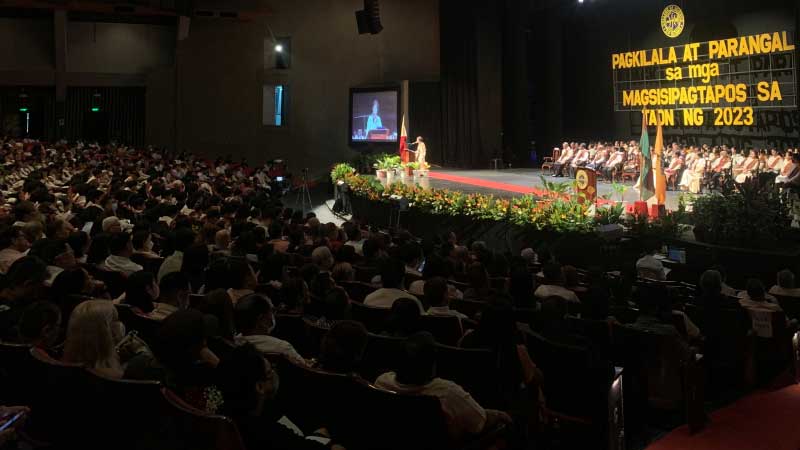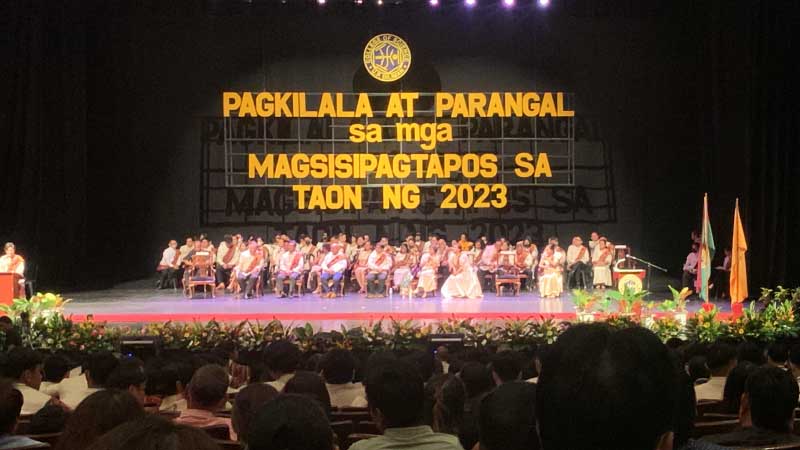
The University of the Philippines-Diliman College of Science (UPD-CS) is poised to make unprecedented contributions to Filipino science and the collective body of human knowledge as it recently posted the most PhD graduates ever in its decades-long history.
A total of 454 newly-minted graduates celebrated the fruits of their labor on the rainy Saturday afternoon of July 29. Among them were 19 PhD graduates, 108 MS graduates, seven MA graduates, three Professional Masters, five diploma recipients, and 312 BS graduates. The number of UPD-CS’ PhD graduates for 2023 is also almost double that of the previous year.
The number of PhD enrollees at UPD-CS has been consistently on the rise every year, with last year’s count reaching 464. UPD-CS’ nine institutes and programs continue to offer a total of 11 doctorate degrees, including the recently-offered PhD in Data Science.
UPD-CS Dean Dr. Giovanni A. Tapang beamed with pride as he welcomed the graduating students, their parents, and guests during the CS Special Recognition Program 2023 at the UP Theater. “This is the most number of PhD graduates we’ve had in CS’ forty-year history,” he said.
The long road taken
Dr. Bernard Alan B. Racoma, this year’s Most Outstanding PhD Graduate from the UPD-CS Institute of Environmental Science and Meteorology (IESM) spoke on behalf of the graduate students, extolling the virtue of taking the long view to one’s goals despite—and even amid—setbacks.
“There shouldn’t be shame when we take a long time in our studies, be it in graduate or undergraduate education. When this happens, more often than not, there are reasons behind it,” he said. “Just like there are reasons why clouds form and it rains, there are always valid reasons why students fall behind, give up, get delayed, or drop out.”
“Graduates of 2023, let’s make it rain. Mabuhay po tayong lahat, mabuhay ang mga siyentista ng bayan. Patuloy nating pagsilbihan ang isa’t isa, patuloy nating pagsilbihan ang taumbayan,” he concluded.
Science within reach of everyone
These sentiments were echoed by BS Physics graduate summa cum laude Mary June Ricaña in her own remarks on behalf of her undergraduate class:
“As of 2019, the Philippines only has 189 scientists per million people—a far cry from the ideal ratio of 380 per million population,” she said. “The truth is, science should not be so difficult to pursue. It should be an arm’s reach to every child who ever looked at the night sky and dreamed of one day exploring galaxies.”
“After today, we will be taking different paths, but we should always remember whom we owe all of these to, and whom all these are for. The world is a laboratory; it is imperative for us to find scientific solutions to problems faced by society. Graduating batch of 2023, let us make science serve the people,” she added.

Establishing a Filipino scientific tradition
Over two decades ago, former UPD-CS Dean physicist Dr. Caesar Saloma underscored the importance of developing a truly Filipino scientific tradition: “I expect the Filipino scientist to contribute towards establishing a scientific culture in the Philippines. I count on him or her to become part of a rich scientific tradition that all Filipinos can be proud of,” he said in his acceptance speech for the Concepcion D. Dadufalza Award for Distinguished Achievement in 2001.
In this vein of tradition, Dr. Tapang acknowledged and thanked his immediate predecessor, the late Dr. Perry Ong, as well as previous deans Dr. Joey Balmaceda, Dr. Rhodora Azanza, and the entire Filipino scientific community. Now four years into his tenure, he has always been vocal about his goal to produce more PhD graduates during his term—a legacy that he hopes will continue in the decades to come.
“Madami pang tanong na kailangang masagot,” he said. “I reiterate my call for all our PhDs to continue to mentor PhD students. And I call on our MS and BS graduates to explore and answer the pressing science questions with your professors in a PhD program here in the College.”

For interview requests and other concerns, please contact media@science.upd.edu.ph.






















